"Good for Your Brain": Dungeons & Dragons Camp Ignites Students' Creativity, Critical Thinking Skills Monday, July 8, 2024
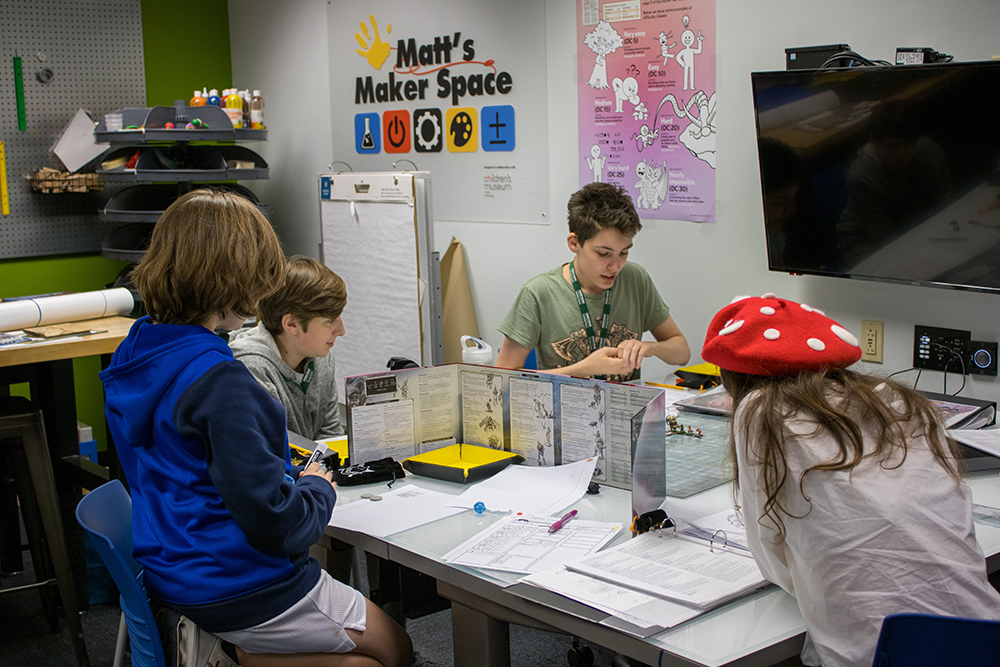
"D&D is a game that has a ton of educational benefits. At its core, the game can teach you teamwork, math, physics, problem-solving and quick decision-making."
Battling bandits to save a dragon's hoard, sneaking past villainous trolls, and solving riddles while traversing a mountain range – middle and high school students explored a wealth of worlds, destinations, characters and more during Point Park University's inaugural Dungeons & Dragons Camp, a week-long deep dive into the iconic roleplaying game.
Created by Phillip Harrity and Fred Angiolieri – both Point Park staff members and graduate students in the School of Education's M.A. in Learning, Design and Technology program – the camp featured hands-on sessions covering gameplay basics, character creation, world building and Dungeon Master storytelling skills, all hosted in Point Park's Matt's Maker Space classrooms. Students also painted miniatures of their characters and monsters, some of which were 3D-printed in the maker space.
The students' journey culminated in a fun-filled gameday, during which they played their own "one-shots," or adventure campaigns that can be completed in a single game session. Each student had the opportunity to serve as Dungeon Master and present the one-shot they wrote, after which they received helpful feedback from the camp instructors.
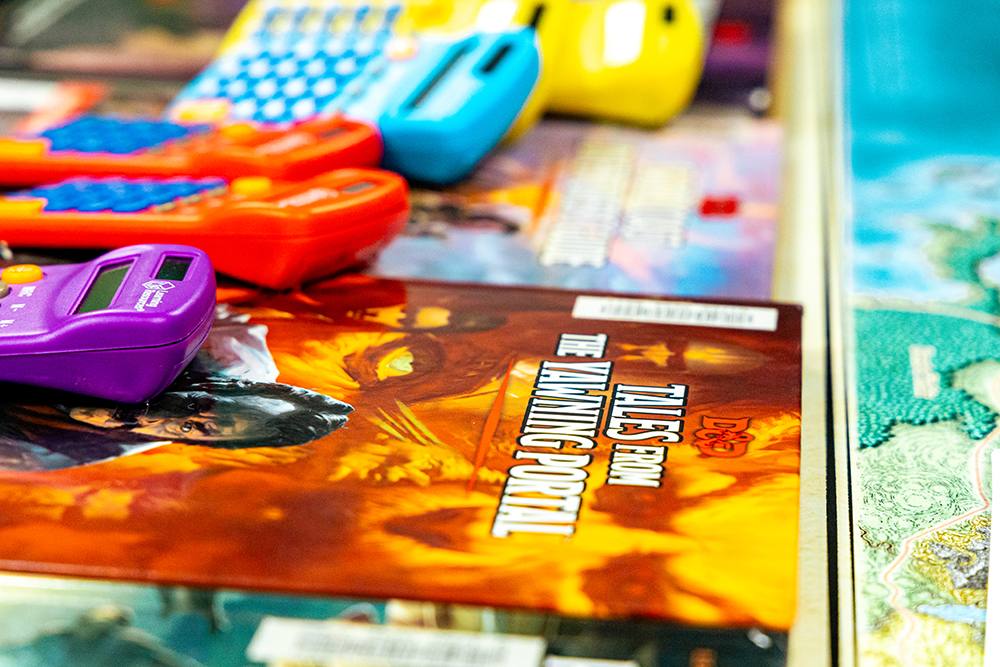
Aiden Winward-Green, a rising eighth-grader at Independence Middle School in Bethel Park, learned about the camp through his school's Dungeons & Dragons, or D&D, club.
"I found out you would get to learn a ton of stuff about Dungeons & Dragons, and I knew some stuff, but I was kind of a beginner, so I was like, 'Hey, that sounds fun, and I'll be a lot more experienced for next year's club,'" he said. "So I had my mom sign me up; I pestered her all week about it."
Winward-Green enjoyed learning more painting skills, like how to add shadowing.
"I also learned a lot about DM-ing and how to make it less or more difficult for the players," he said. "For example, I had to decrease the stats of a monster because it was going up against Level 1 players, and they wouldn't be able to handle it."
Winward-Green had some difficulty in the past in making the stories in his campaigns compelling. He usually just placed monster after monster for players to battle.
"This camp really taught me how to make a more interesting story for the players and how to come up with world-building and stuff like that," he said.
He recommends Point Park's camp due to its convenient location for Pittsburgh-area students, the colorful maker space classrooms and the camp instructors' depth of experience.
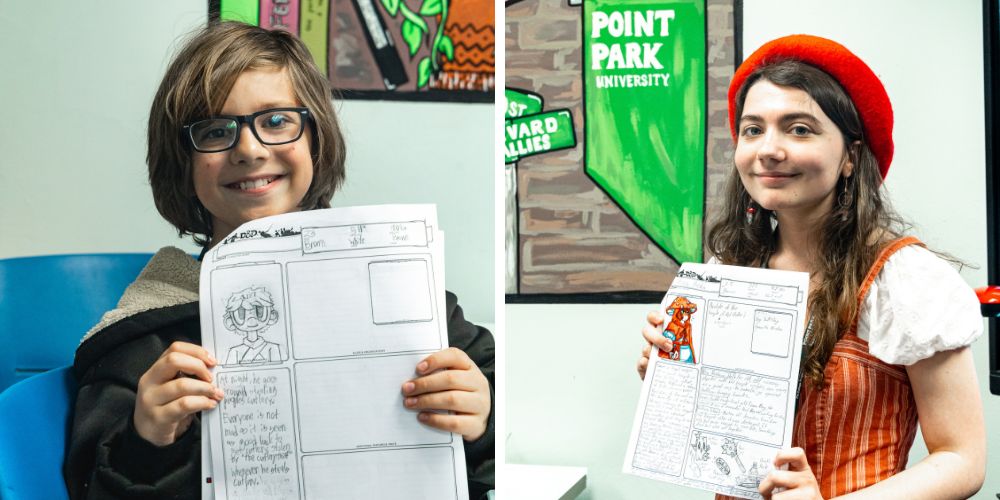
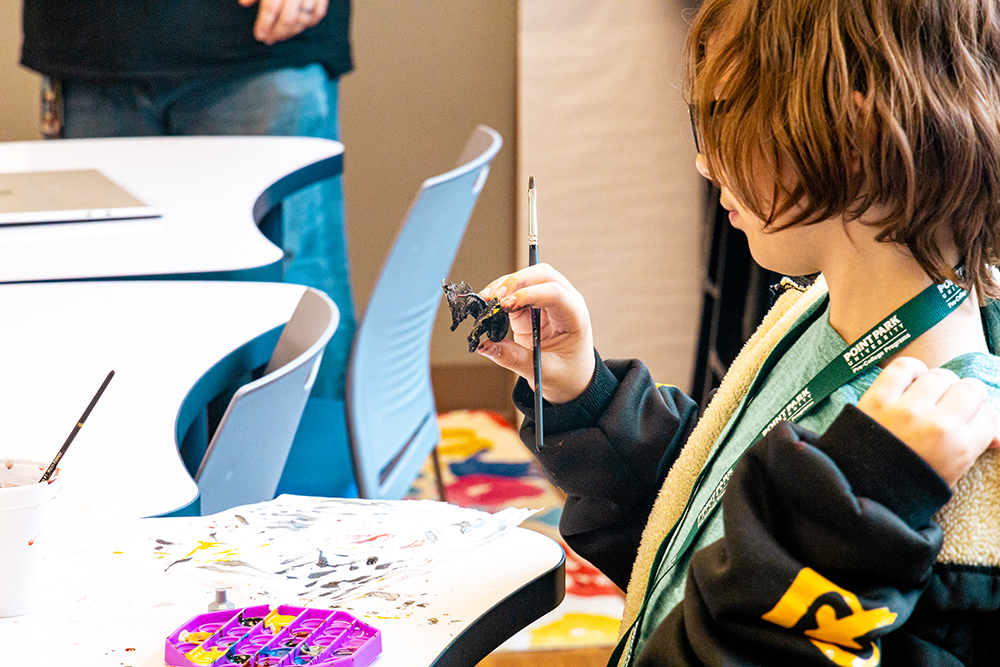
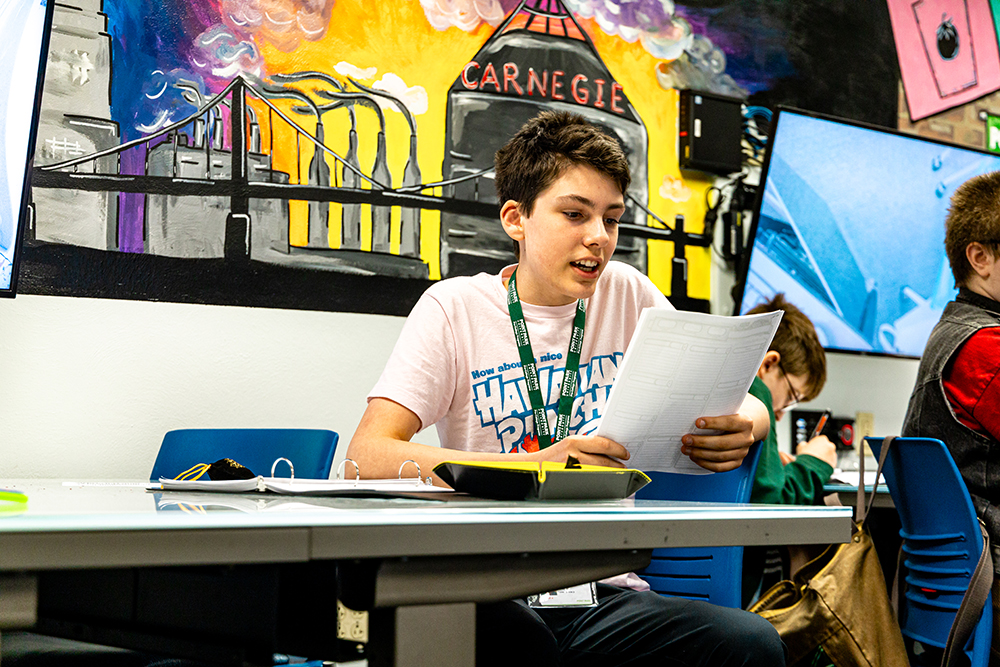
Winward-Green participates in his school's D&D club with Milo Bucher, a rising 10th-grader at Bethel Park High School. Bucher has been playing D&D for three years.
"I liked learning more about the Dungeon Master stuff," he said. "Sometimes I'm asked to be Dungeon Master, but I'm not very good at it. I liked picking up some of those extra skills so next time I can say, 'Yeah, I can do it.'"
Bucher said Point Park's camp is suitable for all skill levels.
"I think it's really cool to learn the basics if you haven't played before, but then there's also enough stuff to learn if you have played before, so it's good for everyone," he said.
Olivia Fuscaldo, a rising senior at Upper St. Clair High School, has been playing D&D for two years. During camp, she sharpened her character sheet skills and enjoyed running her own one-shot.
"I think it's a fun way to make new friends and learn about a new hobby," she said. "I especially think if you're interested in D&D, you shouldn't miss out on this. I know for some people, finding campaigns to play in can be difficult, so this is a really easy way to get into a campaign with a lot of really cool people who are fun to play with."
Lily, an eighth-grader, is an experienced D&D player but still learned a lot about balancing social interaction and combat during the game. She enjoys how the game exercises one's creativity, critical thinking and math skills. For example, a player must be thrifty so as not to spend all their gold in one place, or fall into a goblin's financial scam.
"It's good for your brain," she said. "It's fun."
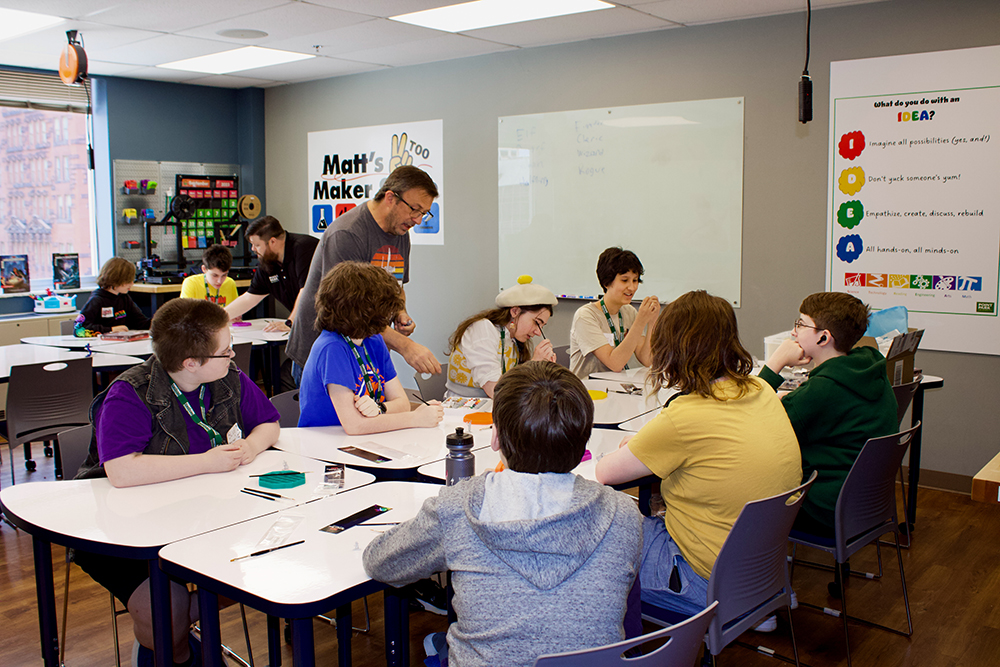
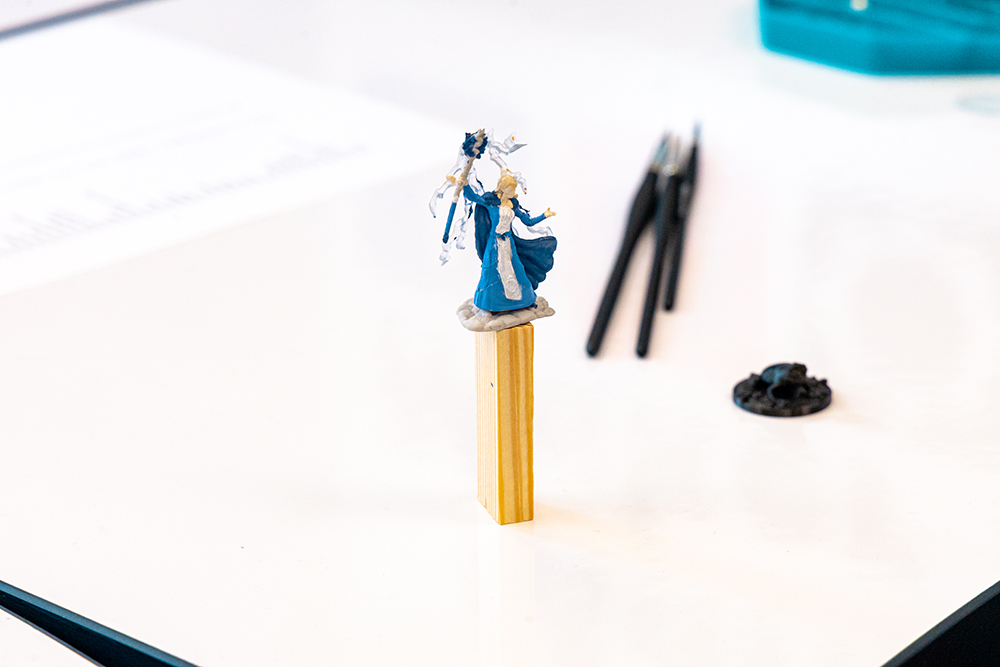
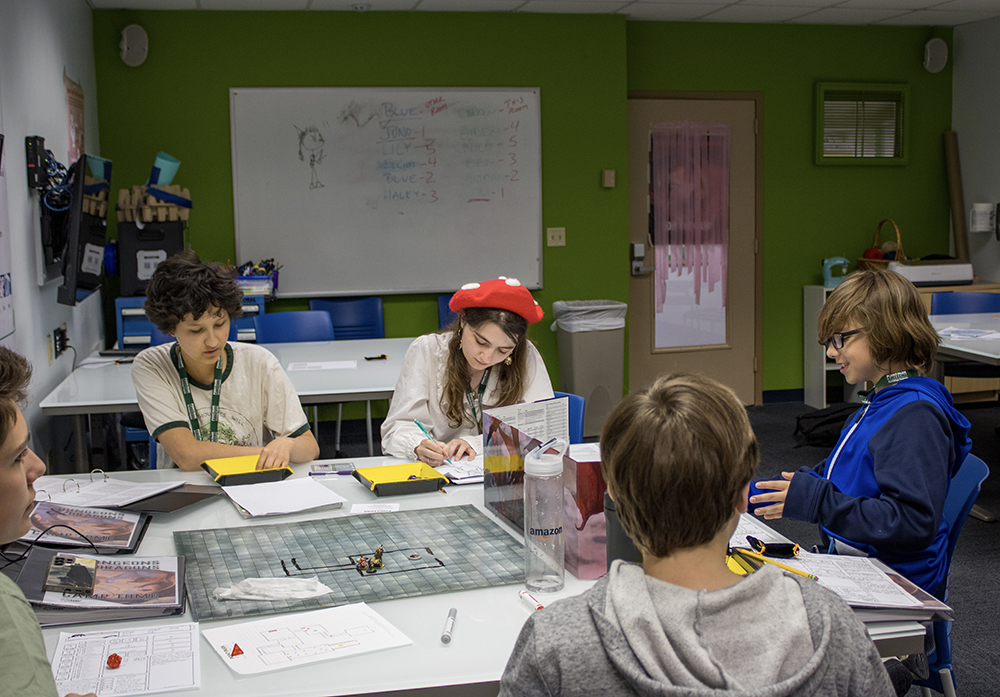
Take a behind-the-scenes look at Dungeons & Dragons Camp:
@pointparku Go behind the scenes of Point Park's first-ever Dungeons & Dragons Camp! Step into imaginative storytelling through the realms of adventure and role-playing ✨ #PointParkUniversity #PointParkU #PointParkSummerCamps #DowntownPittsburgh #MakerSpace #DungeonsAndDragons #DNDTok #DND ♬ Magical Mystery - Mark Fabian & Alexander Smith
Q&A with the instructors:
In the Q&A below, camp instructors Phillip Harrity and Fred Angiolieri describe their passion for D&D and their experience creating the camp as their practicum project for the Learning, Design & Technology master's degree program.
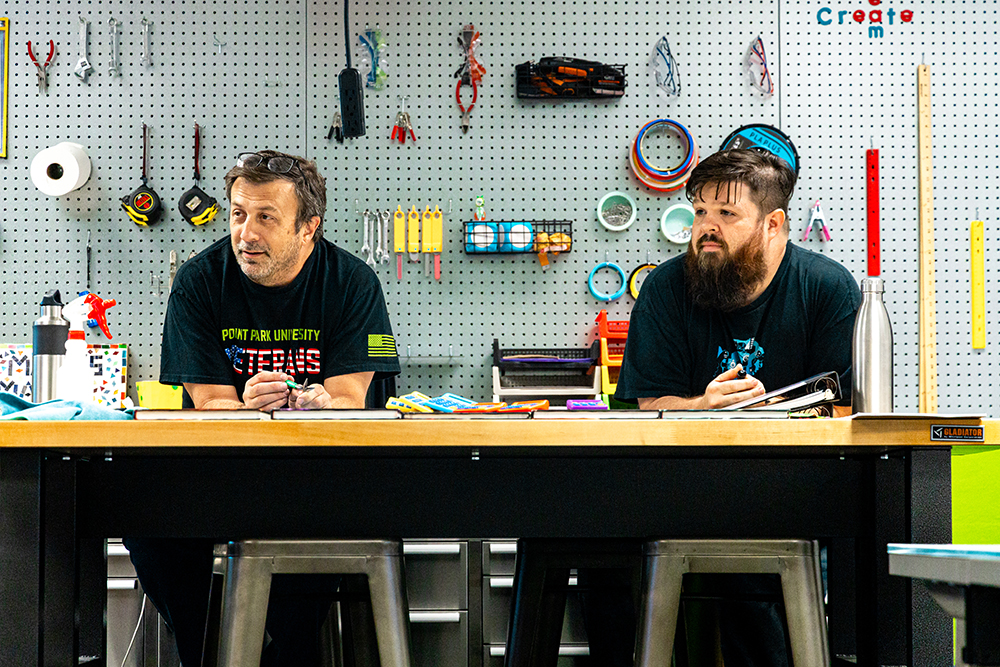
How did you become a D&D fan?
Harrity: I have been playing D&D for 25 years since high school. I first got into it because a group of my friends wanted to try something new when we were hanging out, and it became a great creative outlet that mostly kept me out of trouble.
Angiolieri: I started playing in 1979 when I was in sixth grade and played all through high school and college. After college, it was put aside while I focused on my career and raising a family. Just before the Covid-19 pandemic, I stumbled across Critical Role on YouTube, and it reignited my love of the game. I started playing again with Phill and some others.
What do you love about the game?
Harrity: The creative aspect of the game is really what drew me in. I enjoy storytelling, and this was a great way to be a part of the story or even tell my own stories while learning roleplaying skills along the way.
Angiolieri: I love the collaborative storytelling. As a Dungeon Master, or DM, you have the framework of a story, but it is so rewarding to see where the players will take it. The result is a story that you all create together.
What inspired you to create this camp as your master’s degree practicum project?
Angiolieri: Vincent Rugani, director of Pre-College Programs, had already approached us about running a D&D camp in the summer before we came up with the idea to use it for our practicum requirements in the program. I’m not sure if it was my idea or Phill’s, but we immediately approached our practicum coordinator and she loved the idea.
Harrity: D&D has always been a fun and creative hobby, but Fred and I realized that it could be something that we could share with others. Through the classes that we were taking, we learned about game-based learning and quickly saw the potential of this camp.
How have you applied what you learned in the Learning, Design and Technology program to this endeavor?
Harrity: The Learning, Design and Technology program taught me the basic structures of teaching and how to use them with technology. We learned the basic structure of creating engaging lessons and lesson plans and how to adapt them for Dungeons & Dragons lessons.
Angiolieri: Because it was for our practicum, we were very intentional about our approach to the camp. We wrote lesson plans for each session and really focused on the learning objectives. We also tried to incorporate as much active learning as possible, and I think those activities were what the students liked the most.
What skills can one foster through D&D that those unfamiliar with the game might not be aware of?
Harrity: D&D is a game that has a ton of educational benefits. At its core, the game can teach you teamwork, math, physics, problem-solving and quick decision-making. I think the two strongest benefits are the roleplaying aspects and creativity. Players can learn communication skills and how to think as someone else or outside the box, while a Dungeon Master can learn how to weave a story and foster teamwork as a leader. I think aspects from this game could easily be used in a classroom to make learning fun and memorable.
Angiolieri: For younger players, D&D builds fundamental skills such as math and reading. Regardless of age, D&D builds skills like storytelling, collaboration, critical thinking, teamwork and social skills.
Describe a moment during the camp that reaffirmed your commitment to this project.
Harrity: There were two moments really that stuck out, the first being a yes/and roleplaying lesson that helped the students actively listen and learn to adapt to keep the story going. It was a fun activity, and it was great to see some of the students gain confidence in their voice. The other moment was watching the creativity that each student put into their story that they created and then got to play their creation with others. Some of them began the day nervous, but all of them were having fun as things went along.
Angiolieri: There was a student in the camp that from day one was very shy and stayed off to the side from the rest of the group. I was so encouraged to watch over the course of the week as she came out of her shell, and the big moment was on Friday when they each took a turn at DM’ing for the others. Initially she was hesitant, but when her turn came, she stepped up and did a great job. It was so rewarding to be a part of that, and I hope that this is something she will carry forward in life.
Why would you recommend the Learning, Design and Technology program to prospective students?
Angiolieri: It is fully online and asynchronous, so you can do the work when it’s convenient, and it only takes 18 months to complete. It was a little tough not having a break, but now that we are nearly done I am glad I did it.
Harrity: This program taught me how to use technology as a tool for learning, not a crutch. I came into this program with knowledge about technology and some teaching. This program helped me join the two for a better learning/teaching experience.

